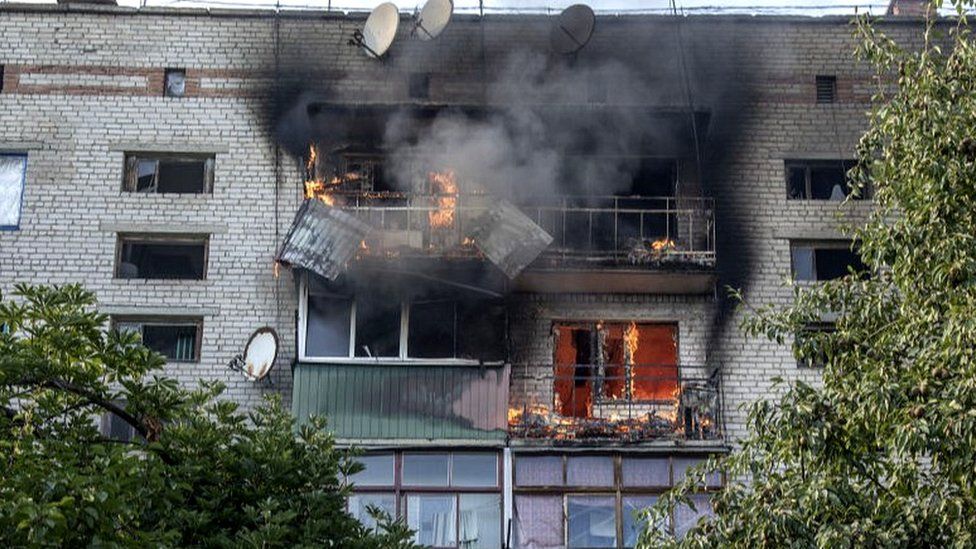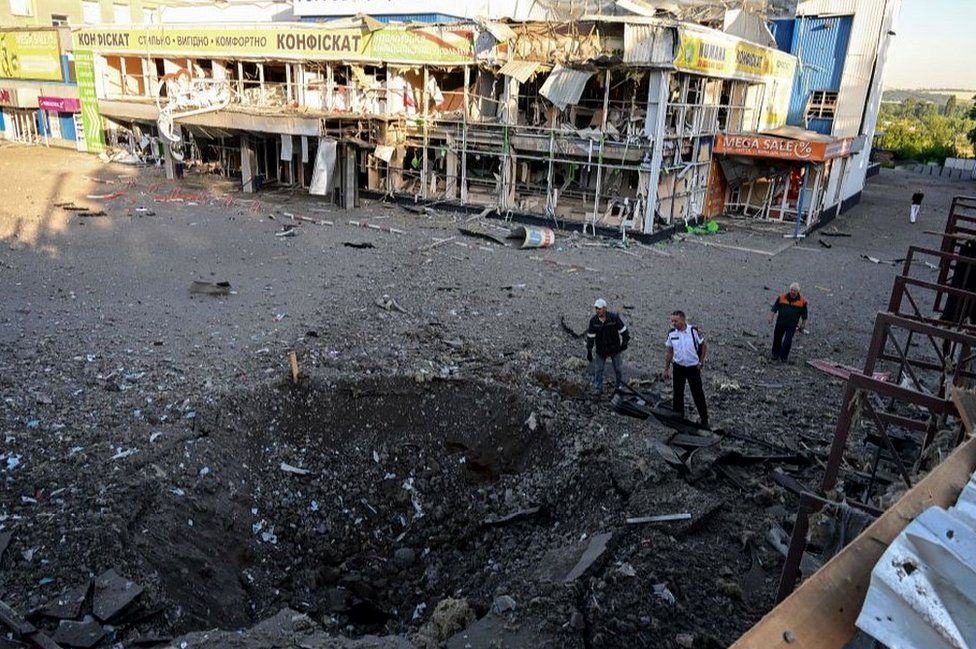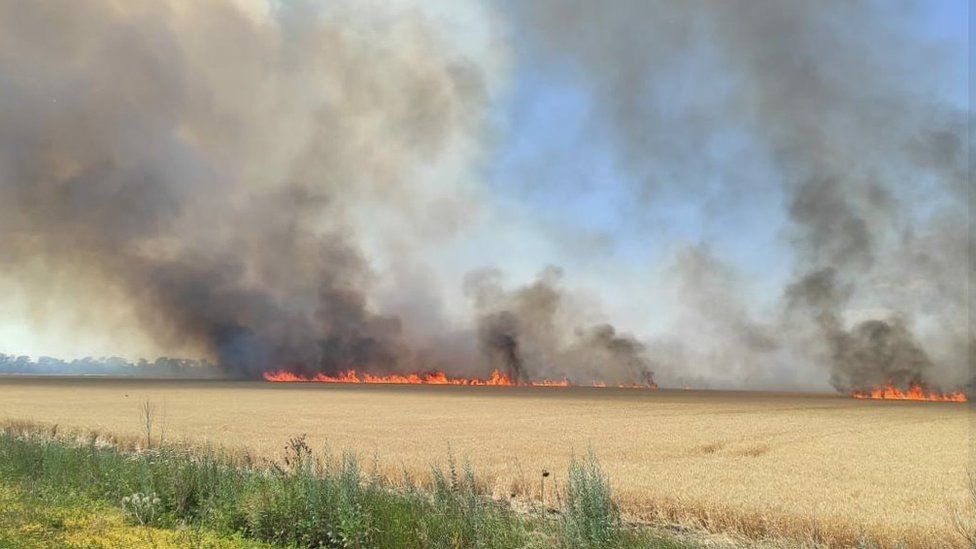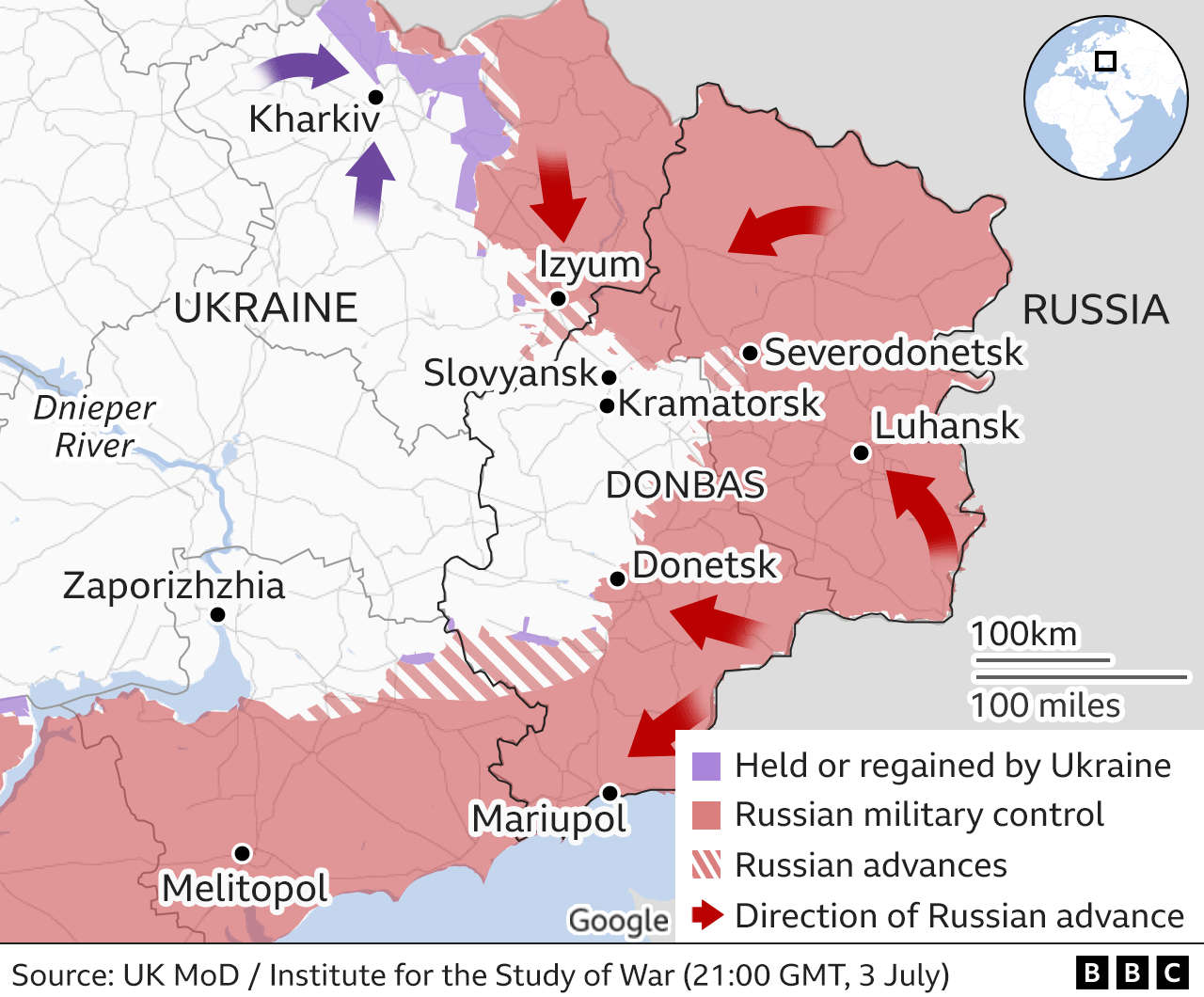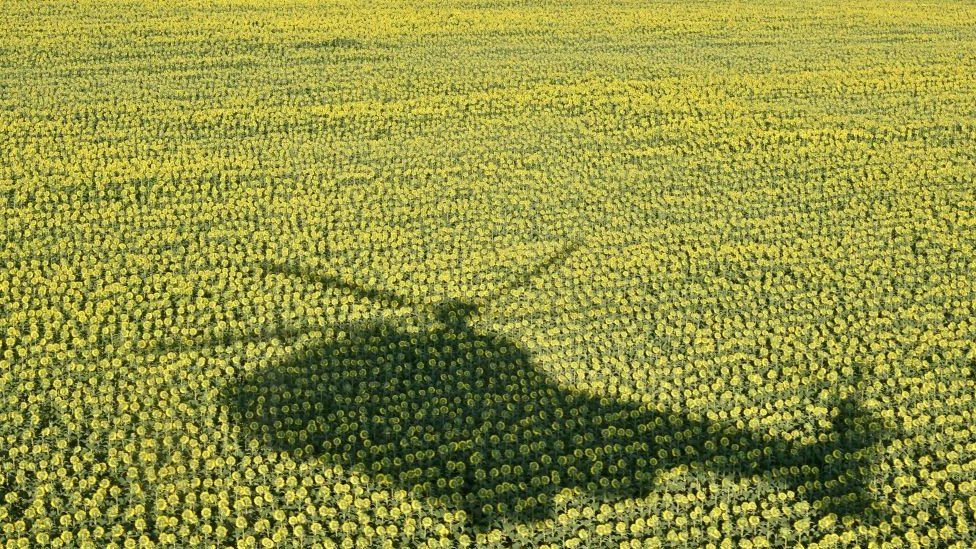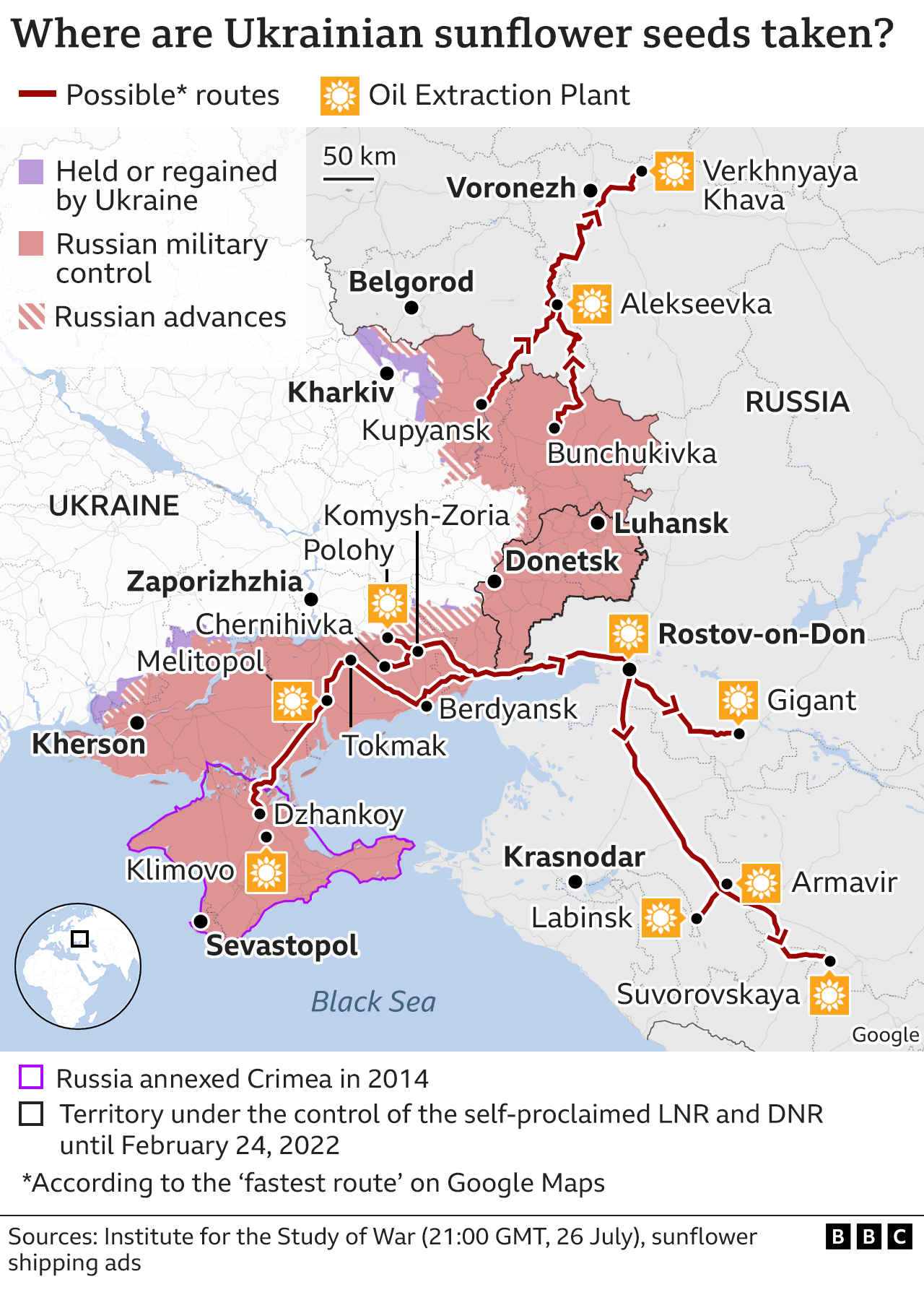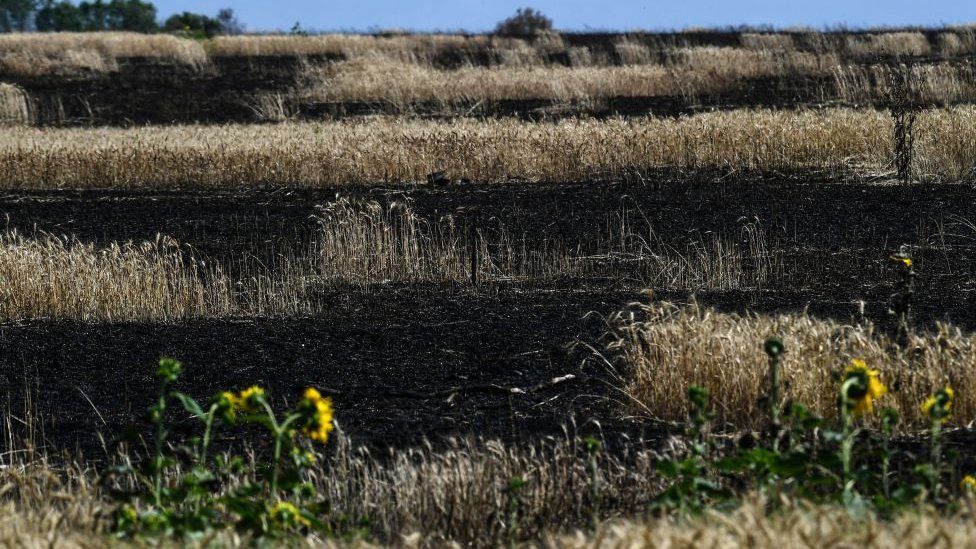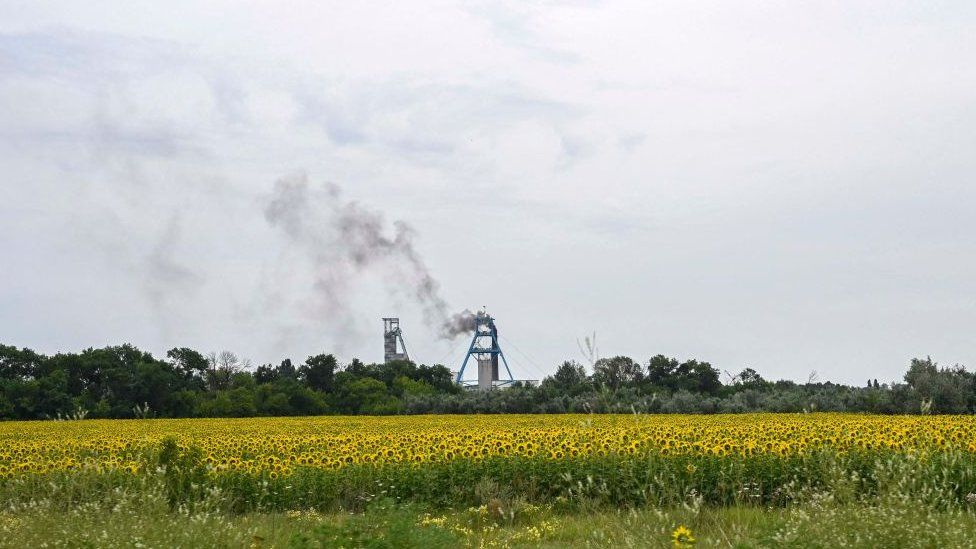https://www.bbc.co.uk/news/61790625
Where is Russia taking Ukraine's stolen grain?
By Nick Beake, Maria Korenyuk and Reality Check team
BBC News
Published 2 hours ago
Additional reporting from Ukraine by Hanna Tsyba, Sira Thierij and Hanna Chornous
Additional reporting from London by Daniele Palumbo, Josh Cheetham, Jake Horton, Erwan Rivault and Andrei Zakharov
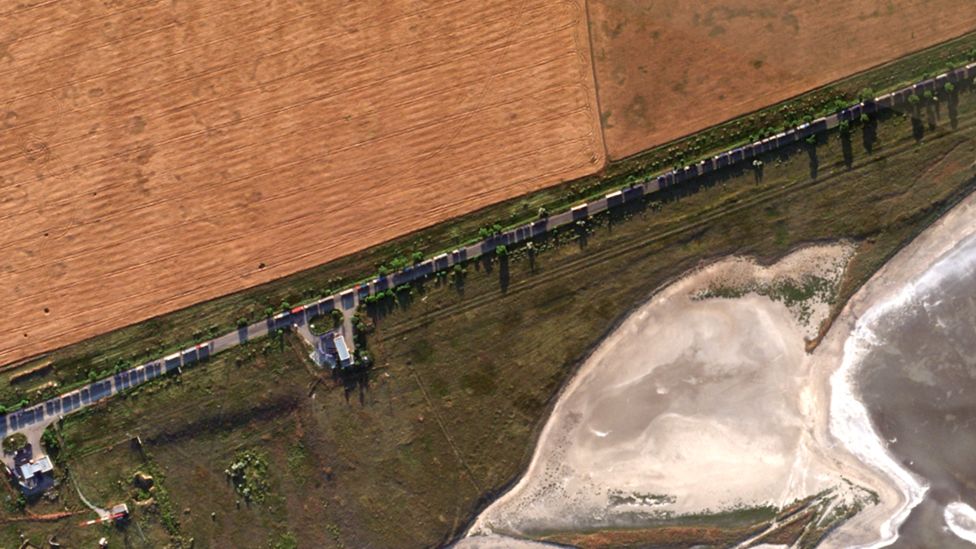
Russian forces have been repeatedly accused of stealing grain from Ukrainian farmers in occupied areas as well as other crops such as sunflower seeds, along with fertiliser and agricultural equipment. The BBC has spoken to farmers, analysed satellite images and followed tracking data to look for evidence of where stolen grain is going.
A few dozen miles from the frontline, Ukrainian farmer Dmytro describes how the business he nurtured over 25 years was lost in four months of Russian occupation.
The BBC tried to contact more than 200 farmers whose land is now in Russian-occupied territory. Dmytro - we are not using his real name to protect him from reprisals - was one of the few willing to meet us.
"They stole our grain. They destroyed our premises, destroyed our equipment."
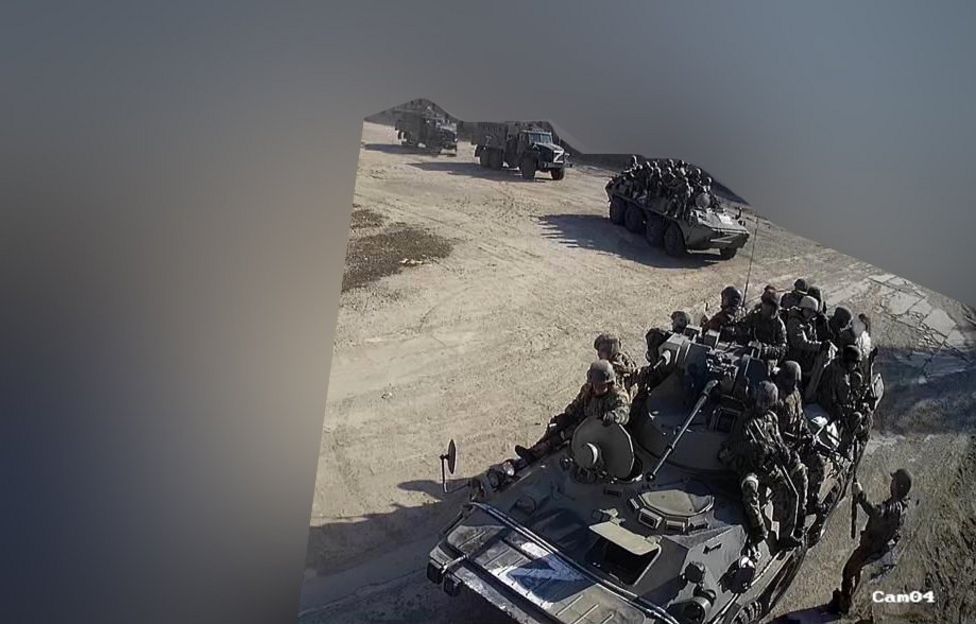
CCTV footage of the moment Russian soldiers arrived at a storage facility
He says Russian forces now occupy 80% of the tens of thousands of hectares he farms and accuses them of stealing grain on an industrial scale.
CCTV from one of the company's sites captured the moment the Russians arrived. We've blurred some of the surroundings to protect the identities of the farm owners.
Later in the footage, one soldier spots a security camera and shoots at it, but misses.
Grain trucks were stolen and Dmytro says a couple of them had GPS trackers fitted.
We were able to use this data to see they had gone south into Crimea, which Russia annexed in 2014, and then on to Russia.
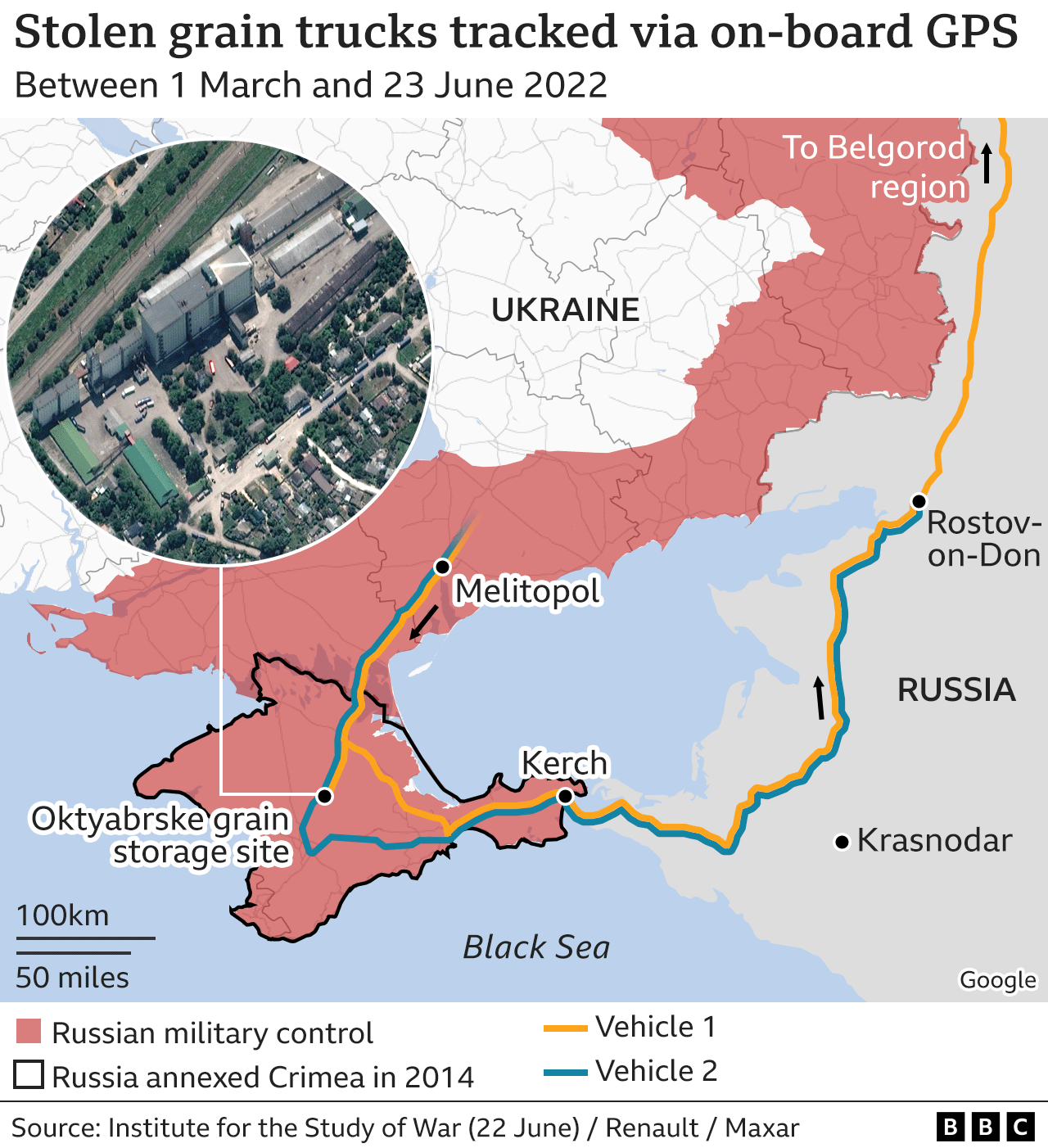
From the GPS data, both trucks stopped near a storage facility - identified as a site for unloading and storing grain - in the Crimean town of Oktyabrske.
In a satellite image from 14 June this year - you can see a line of trucks on the road next to the facility.
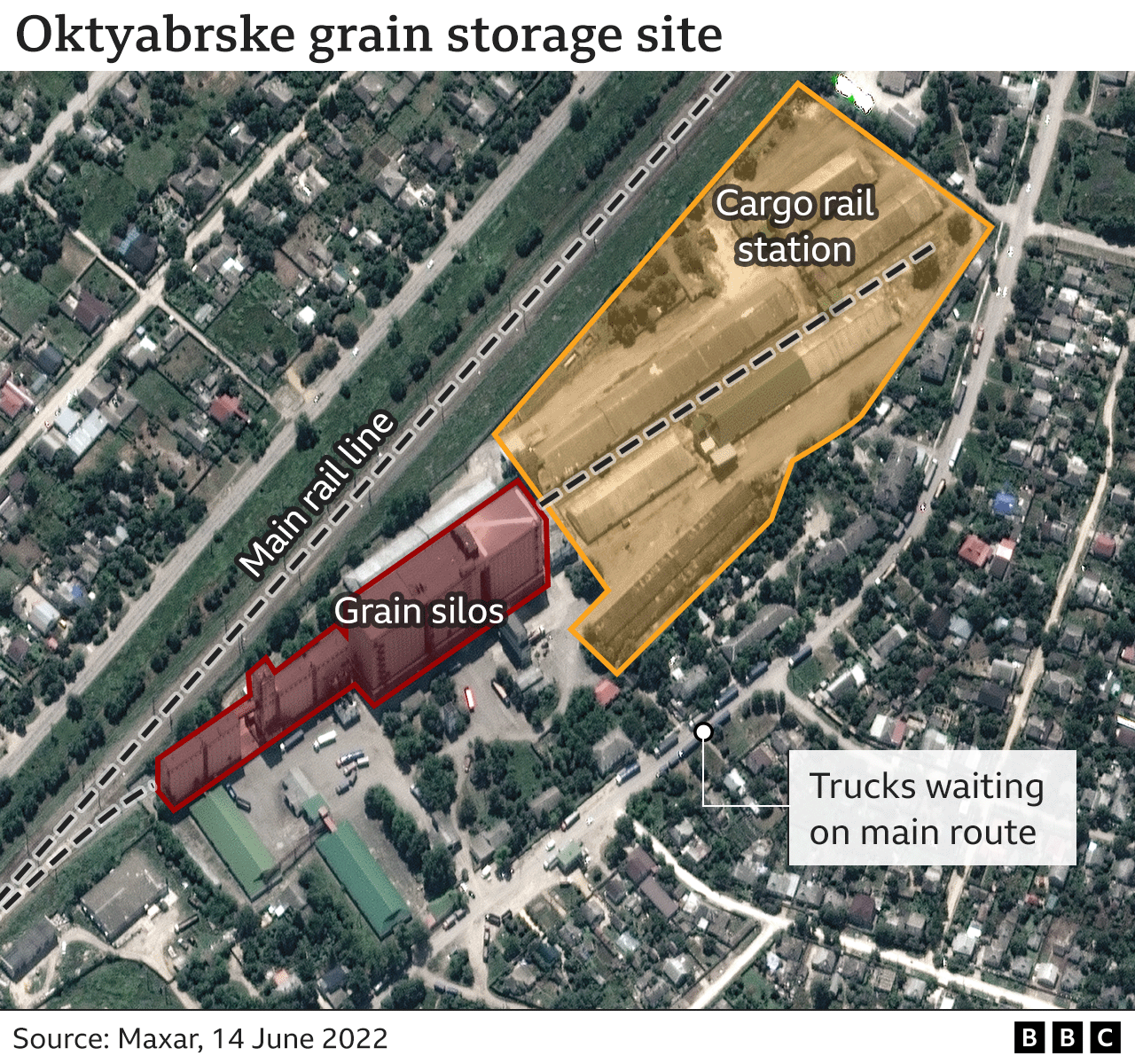
We can see the storage facility is next to a rail line, which can be used to transport grain either into Russia or down to ports in southern Crimea. The top of the storage site also appears to have the Z symbol - the emblem of Russia's invasion - on the roof.
Queues at the border
It's very hard to track individual shipments of stolen grain but there is plenty of evidence that much of it goes first to Crimea. There is satellite imagery at two key entry points - at Chonhar and Armiansk - in which you can see a build-up of vehicles, which could be used to transport grain and other produce.
An image from the Chonhar entry point taken on 17 June shows a line of trucks more than 5km (three miles) long.
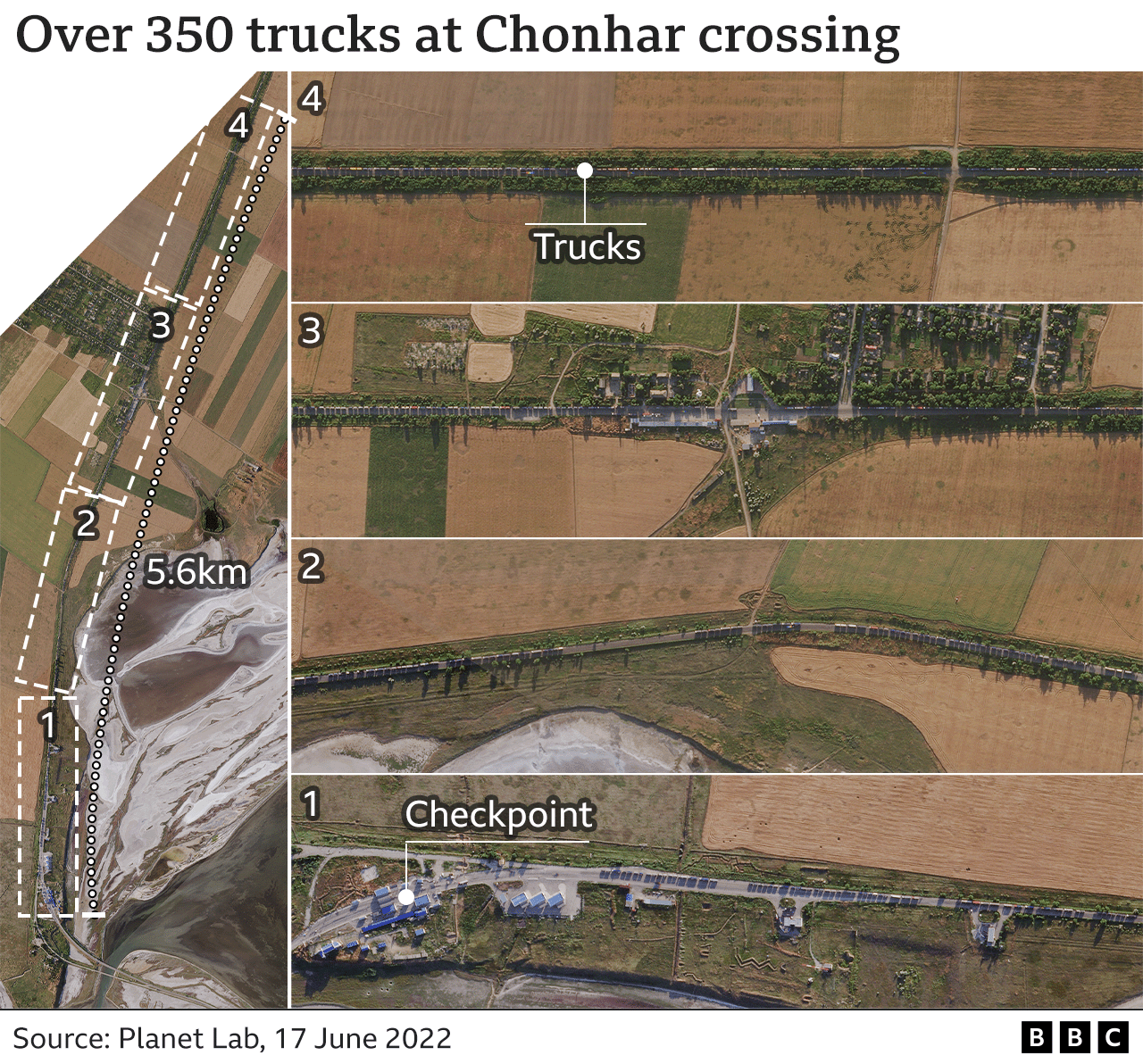
This level of road traffic into Crimea is unusual as Ukraine has not had access to the area since it was annexed by Russia in 2014, and has been exporting grain and other products from elsewhere.
It might be possible to explain some of the volume of traffic as empty trucks returning from the occupied areas having delivered supplies to Russian troops. But an obvious interpretation is that many of the trucks are carrying grain - or other products like sunflower seeds - taken from Ukrainian farmers.
Satellite images of the town of Dzhankoi in Crimea show trucks waiting on a road next to a grain storage facility and near the connected train station.
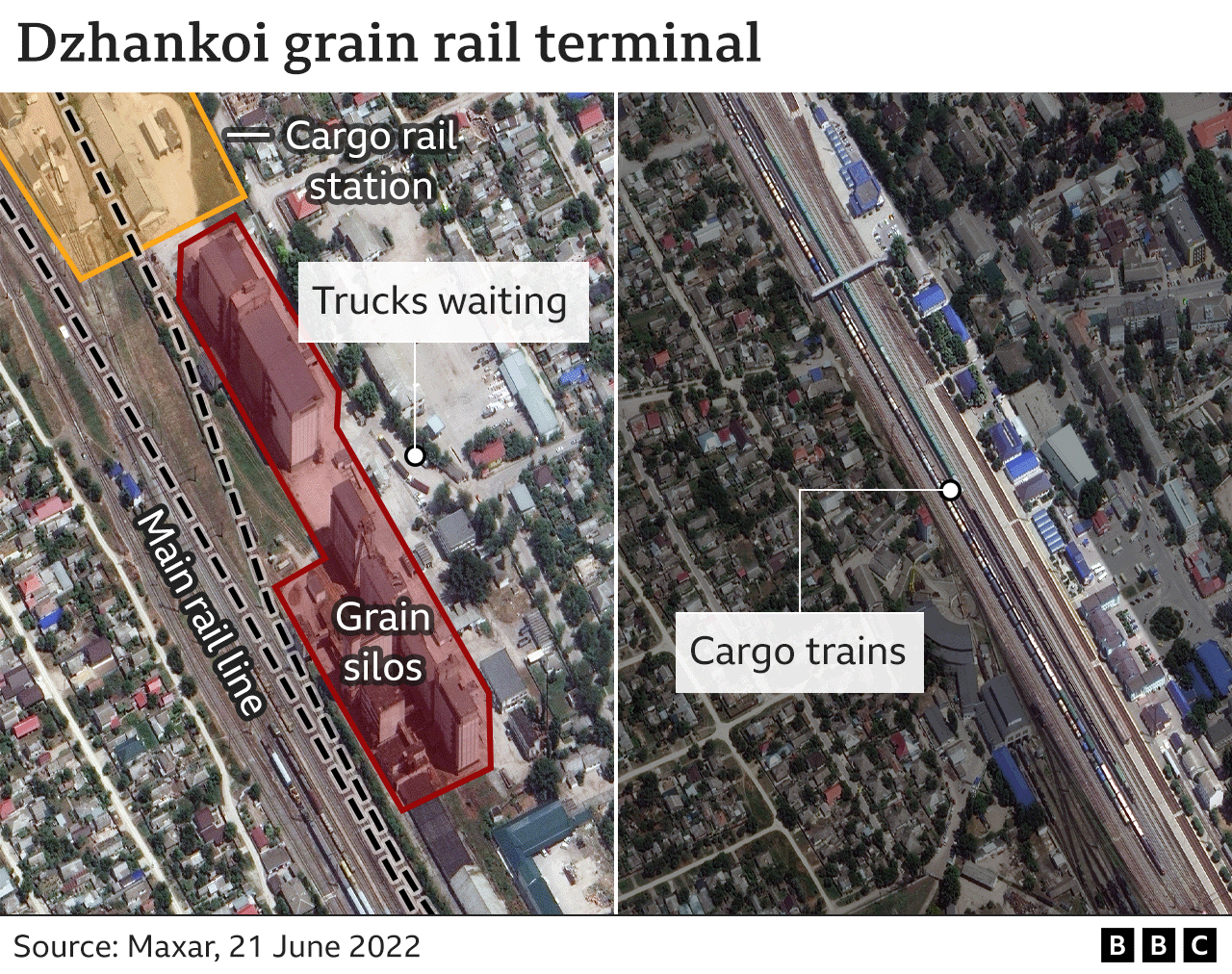
The images show cargo trains - with wagons of the type used to transport grain and other produce - at the station next to the storage facility.
Trains from Dzhankoi are connected to the ports of Sevastopol and Kerch, where produce can be moved into Russia or abroad.
Where is Ukrainian grain taken after Crimea?
"They take grain to the annexed Crimea first, where they transport it to Kerch or Sevastopol [ports], then they load Ukrainian grain on Russian ships and go to the Kerch Strait," says Andrii Klymenko, an expert at the Institute for Black Sea Strategic Studies in Kyiv, who regularly monitors movements of ships around Crimea.
"There, in the Kerch Strait [between Crimea and Russia], they transfer Ukrainian grain from small ships on to bulk carriers, where it is mixed with grain from Russia - or in some cases, they sail to this area just to give the appearance they are loading up with Russian grain."
He adds this is then exported with Russian certificates, saying that it's Russian grain.
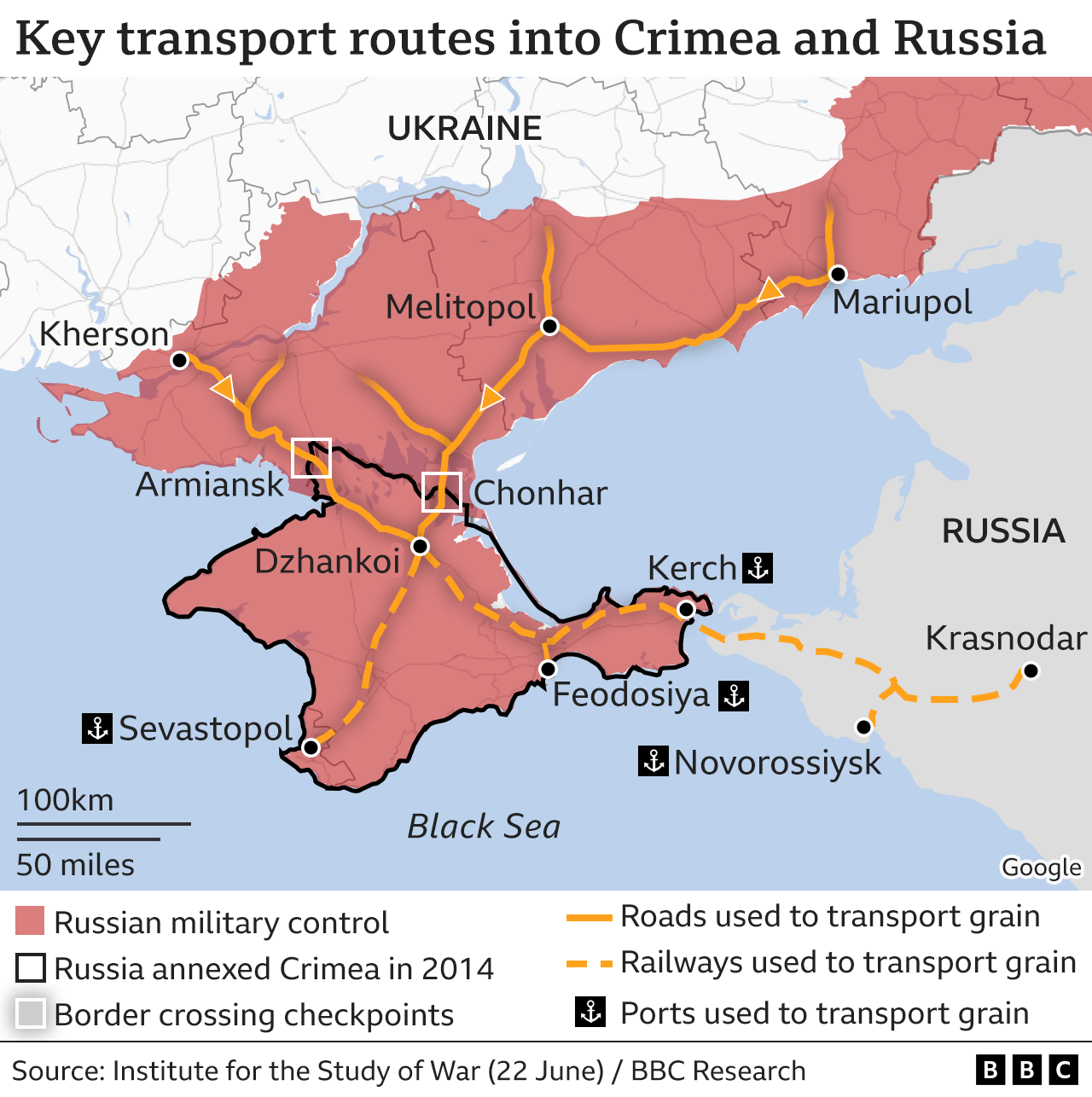
Ships have then often headed on to Syria or Turkey.
Turkish Foreign Minister Mevlut Cavusoglu has said they have investigated claims about Ukrainian grain being shipped to Turkey and so far not found any evidence.
"We saw that the ships' port of departure and the origin of the goods is Russia on the records," he said.
Unusual volume of activity in Sevastopol
Satellite images from the Avlita grain terminal at the port of Sevastopol in the west of Crimea show a high level of activity throughout June, with yellow material consistent with the colour of grain being loaded on to a series of ships.
Video
Media caption: Evidence of cargo vessels being loaded with grain in the Avlita Grain Terminal, Sevastopol
We reviewed images of the same terminal in June over the past few years, and this amount of activity appears to be unusually high.
Some experts we spoke to said this activity could only be accounted for by grain transported from Ukraine's mainland. "Crimea doesn't really grow a lot of grain for export," says Mariia Bogonos, agriculture policy expert at the Kyiv School of Economics.
It would also not make geographical sense for Russia to use Sevastopol to export its own grain.
But Mike Lee, an agriculture expert with Green Square Agro who has worked in both Ukraine and Russia, says some grain coming out of Crimea could be part of a backlog from last year's harvest, kept in storage because of the war. "Crimea is under Russian control, but supply chains have been affected there as well."
The ships that turn off their trackers
From Crimea, the US and Ukrainian authorities and media reports have named nine ships believed to have transported stolen Ukrainian grain abroad.
Using data from Lloyd's List Intelligence, the BBC has tracked these ships on journeys between Crimea and ports in Turkey and Syria since April.
Lloyd's List Intelligence says the vessels have used what maritime specialists would describe as "deceptive" sailing practices - switching off their on-board trackers when entering the Black Sea, or moving around the Kerch Strait near Crimea.
When their trackers come back online, the ships are sailing south and many report a lower depth in the water, suggesting they've taken on cargo during the blackout.
The BBC mapped the journeys of three vessels: the Matros Pozynich and Sormovskiy 48, owned by two companies in Russia, as well as the Finikia, owned by the Syrian General Maritime Authority.
We tried to contact the Russian-registered owners of these vessels to ask about the journeys, but did not get a response. We were unable to get through to the Syrian owners.
Despite the gaps in their tracker histories, satellite imagery has revealed where some of the ships have been.
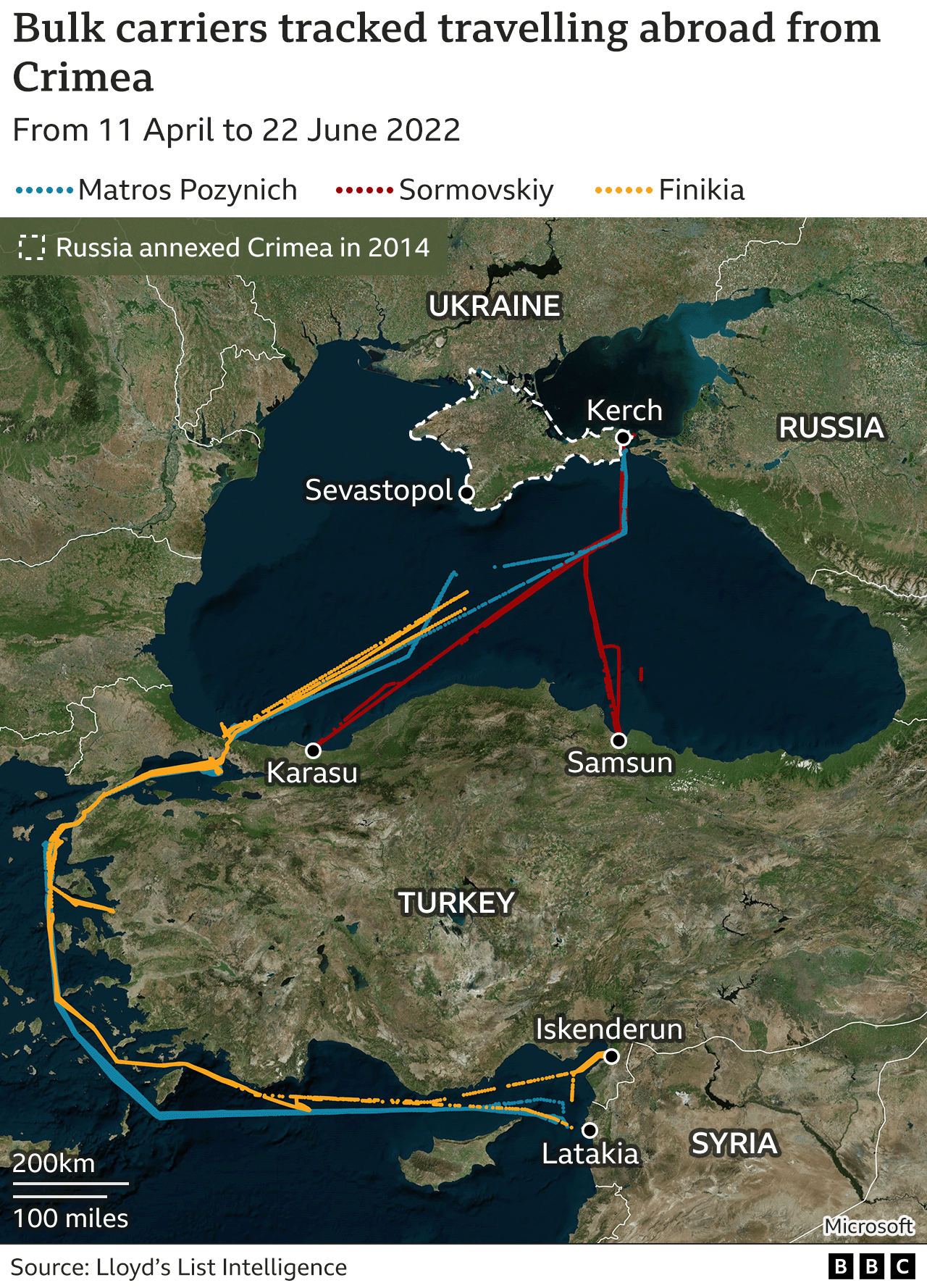
Pictures from Maxar show the Matros Pozynich in Sevastopol in Crimea in mid-May. During this trip, it sailed to the Kerch Strait, had a transponder blackout for five days, and then reappeared hundreds of miles south in the Black Sea. It was later pictured in the Syrian port of Latakia - but had its tracking system off.
Under the UN's Safety of Life at Sea (SOLAS), ships must have their trackers switched on at all times, unless it poses a threat to their safety and security - from piracy, for example.
Michelle Wiese Bockmann, a market editor at Lloyd's, believes there is no justification for turning off trackers near Crimea or near the Syrian coast.
"This practice is clearly not linked with piracy risks," says Ms Bockmann. "Other ships have their transponders on, so why don't they?"
Russia's tactics
The BBC has also obtained documents drawn up by the Russian occupying authorities listing farms where grain is to be transferred to them.
A separate investigation by BBC Russian and BBC Ukrainian has shown that in some cases, the Russians are forcing Ukrainian farmers to sell grain at prices well below market rates, and sign documents to prove it was purchased "legally".
While early reports were typically of outright theft by Russian forces, farmers suggest there has been a change in tactics as the Russians realise that if they pay nothing, future harvests could be sabotaged. The farmers say they have to accept the low prices as they have no alternative and need to buy fuel and pay workers.
Emilie Pottle, an international law barrister, told the BBC that these actions may violate the Geneva Convention and International Criminal Court (ICC) rules governing occupying powers.
We contacted the Russian authorities to ask about these allegations, but have yet to receive a response.
However, some officials in Russian-held areas have spoken openly about Ukrainian grain being taken from the areas they now control.
Where is Russia taking Ukraine's stolen grain?
By Nick Beake, Maria Korenyuk and Reality Check team
BBC News
Published 2 hours ago
Additional reporting from Ukraine by Hanna Tsyba, Sira Thierij and Hanna Chornous
Additional reporting from London by Daniele Palumbo, Josh Cheetham, Jake Horton, Erwan Rivault and Andrei Zakharov

Russian forces have been repeatedly accused of stealing grain from Ukrainian farmers in occupied areas as well as other crops such as sunflower seeds, along with fertiliser and agricultural equipment. The BBC has spoken to farmers, analysed satellite images and followed tracking data to look for evidence of where stolen grain is going.
A few dozen miles from the frontline, Ukrainian farmer Dmytro describes how the business he nurtured over 25 years was lost in four months of Russian occupation.
The BBC tried to contact more than 200 farmers whose land is now in Russian-occupied territory. Dmytro - we are not using his real name to protect him from reprisals - was one of the few willing to meet us.
"They stole our grain. They destroyed our premises, destroyed our equipment."

CCTV footage of the moment Russian soldiers arrived at a storage facility
He says Russian forces now occupy 80% of the tens of thousands of hectares he farms and accuses them of stealing grain on an industrial scale.
CCTV from one of the company's sites captured the moment the Russians arrived. We've blurred some of the surroundings to protect the identities of the farm owners.
Later in the footage, one soldier spots a security camera and shoots at it, but misses.
Grain trucks were stolen and Dmytro says a couple of them had GPS trackers fitted.
We were able to use this data to see they had gone south into Crimea, which Russia annexed in 2014, and then on to Russia.
From the GPS data, both trucks stopped near a storage facility - identified as a site for unloading and storing grain - in the Crimean town of Oktyabrske.
In a satellite image from 14 June this year - you can see a line of trucks on the road next to the facility.

We can see the storage facility is next to a rail line, which can be used to transport grain either into Russia or down to ports in southern Crimea. The top of the storage site also appears to have the Z symbol - the emblem of Russia's invasion - on the roof.
Queues at the border
It's very hard to track individual shipments of stolen grain but there is plenty of evidence that much of it goes first to Crimea. There is satellite imagery at two key entry points - at Chonhar and Armiansk - in which you can see a build-up of vehicles, which could be used to transport grain and other produce.
An image from the Chonhar entry point taken on 17 June shows a line of trucks more than 5km (three miles) long.

This level of road traffic into Crimea is unusual as Ukraine has not had access to the area since it was annexed by Russia in 2014, and has been exporting grain and other products from elsewhere.
It might be possible to explain some of the volume of traffic as empty trucks returning from the occupied areas having delivered supplies to Russian troops. But an obvious interpretation is that many of the trucks are carrying grain - or other products like sunflower seeds - taken from Ukrainian farmers.
Satellite images of the town of Dzhankoi in Crimea show trucks waiting on a road next to a grain storage facility and near the connected train station.

The images show cargo trains - with wagons of the type used to transport grain and other produce - at the station next to the storage facility.
Trains from Dzhankoi are connected to the ports of Sevastopol and Kerch, where produce can be moved into Russia or abroad.
Where is Ukrainian grain taken after Crimea?
"They take grain to the annexed Crimea first, where they transport it to Kerch or Sevastopol [ports], then they load Ukrainian grain on Russian ships and go to the Kerch Strait," says Andrii Klymenko, an expert at the Institute for Black Sea Strategic Studies in Kyiv, who regularly monitors movements of ships around Crimea.
"There, in the Kerch Strait [between Crimea and Russia], they transfer Ukrainian grain from small ships on to bulk carriers, where it is mixed with grain from Russia - or in some cases, they sail to this area just to give the appearance they are loading up with Russian grain."
He adds this is then exported with Russian certificates, saying that it's Russian grain.

Ships have then often headed on to Syria or Turkey.
Turkish Foreign Minister Mevlut Cavusoglu has said they have investigated claims about Ukrainian grain being shipped to Turkey and so far not found any evidence.
"We saw that the ships' port of departure and the origin of the goods is Russia on the records," he said.
Unusual volume of activity in Sevastopol
Satellite images from the Avlita grain terminal at the port of Sevastopol in the west of Crimea show a high level of activity throughout June, with yellow material consistent with the colour of grain being loaded on to a series of ships.
Video
Media caption: Evidence of cargo vessels being loaded with grain in the Avlita Grain Terminal, Sevastopol
We reviewed images of the same terminal in June over the past few years, and this amount of activity appears to be unusually high.
Some experts we spoke to said this activity could only be accounted for by grain transported from Ukraine's mainland. "Crimea doesn't really grow a lot of grain for export," says Mariia Bogonos, agriculture policy expert at the Kyiv School of Economics.
It would also not make geographical sense for Russia to use Sevastopol to export its own grain.
But Mike Lee, an agriculture expert with Green Square Agro who has worked in both Ukraine and Russia, says some grain coming out of Crimea could be part of a backlog from last year's harvest, kept in storage because of the war. "Crimea is under Russian control, but supply chains have been affected there as well."
The ships that turn off their trackers
From Crimea, the US and Ukrainian authorities and media reports have named nine ships believed to have transported stolen Ukrainian grain abroad.
Using data from Lloyd's List Intelligence, the BBC has tracked these ships on journeys between Crimea and ports in Turkey and Syria since April.
Lloyd's List Intelligence says the vessels have used what maritime specialists would describe as "deceptive" sailing practices - switching off their on-board trackers when entering the Black Sea, or moving around the Kerch Strait near Crimea.
When their trackers come back online, the ships are sailing south and many report a lower depth in the water, suggesting they've taken on cargo during the blackout.
The BBC mapped the journeys of three vessels: the Matros Pozynich and Sormovskiy 48, owned by two companies in Russia, as well as the Finikia, owned by the Syrian General Maritime Authority.
We tried to contact the Russian-registered owners of these vessels to ask about the journeys, but did not get a response. We were unable to get through to the Syrian owners.
Despite the gaps in their tracker histories, satellite imagery has revealed where some of the ships have been.

Pictures from Maxar show the Matros Pozynich in Sevastopol in Crimea in mid-May. During this trip, it sailed to the Kerch Strait, had a transponder blackout for five days, and then reappeared hundreds of miles south in the Black Sea. It was later pictured in the Syrian port of Latakia - but had its tracking system off.
Under the UN's Safety of Life at Sea (SOLAS), ships must have their trackers switched on at all times, unless it poses a threat to their safety and security - from piracy, for example.
Michelle Wiese Bockmann, a market editor at Lloyd's, believes there is no justification for turning off trackers near Crimea or near the Syrian coast.
"This practice is clearly not linked with piracy risks," says Ms Bockmann. "Other ships have their transponders on, so why don't they?"
Russia's tactics
The BBC has also obtained documents drawn up by the Russian occupying authorities listing farms where grain is to be transferred to them.
A separate investigation by BBC Russian and BBC Ukrainian has shown that in some cases, the Russians are forcing Ukrainian farmers to sell grain at prices well below market rates, and sign documents to prove it was purchased "legally".
While early reports were typically of outright theft by Russian forces, farmers suggest there has been a change in tactics as the Russians realise that if they pay nothing, future harvests could be sabotaged. The farmers say they have to accept the low prices as they have no alternative and need to buy fuel and pay workers.
Emilie Pottle, an international law barrister, told the BBC that these actions may violate the Geneva Convention and International Criminal Court (ICC) rules governing occupying powers.
We contacted the Russian authorities to ask about these allegations, but have yet to receive a response.
However, some officials in Russian-held areas have spoken openly about Ukrainian grain being taken from the areas they now control.
